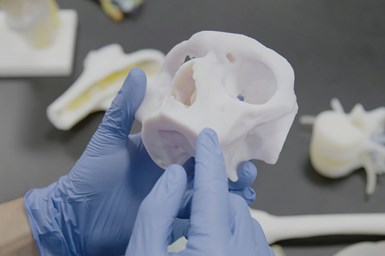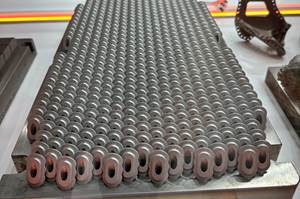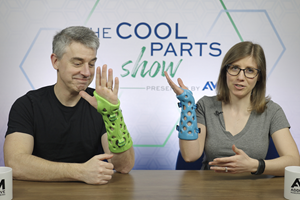Stratasys Partners With Ricoh for Print-On-Demand Medical Models
This offering gives clinicians and patients increased access to patient-specific, 3D printed models for preoperative surgical planning, diagnostic use and surgical education to improve clinical outcomes and drive significant savings through improved productivity.
Anatomic 3D printed models enable medical staff to practice and plan for surgeries. Photo Credit: Stratasys
Stratasys has signed an agreement with Ricoh USA to provide on-demand 3D-printed anatomic models for clinical settings. Stratasys’ patient-specific 3D solutions combines 3D printing technology from Stratasys, the cloud-based Segmentation-as-a-Service solution from Axial3D and precision additive manufacturing (AM) services from Ricoh into one convenient solution.
The new service builds on an existing relationship between Ricoh 3D for Healthcare and Stratasys to expand access to 3D-printed medical models. The partners say offering this solution means democratized, wider access to patient-specific 3D-printed models that can improve outcomes and the patient experience, while also enhancing physician education and training.
Anatomic 3D-printed models are realistic, specific visualizations of a patient’s anatomy, enabling practitioners to plan and practice complex surgeries and improve communication between medical staff, the patient and their families. Digital Anatomy technology from Stratasys even enables these models to be biomechanically realistic, with the feel and responsiveness of real bone and tissue.
While this method of surgical planning offers benefits to patients and care teams, the need for up-front capital investments and on-site 3D printing technical expertise are significant barriers to its adoption. It is said this new service removes those barriers to expand access to more hospitals and clinics, and ultimately contributes to better outcomes.
This offering gives clinicians and patients increased access to patient-specific 3D-printed models for preoperative surgical planning, diagnostic use and surgical education. Using these models, clinicians can demonstrate treatment decisions to patients and surgical staff. Surgical planning with patient-specific 3D models can improve clinical outcomes and drive significant savings through improved productivity.
With this collaboration, customers can upload medical files to a secure, cloud-based service where Axial3D’s artificial intelligence-powered software automatically converts medical scans into 3D-printable files. The files are then printed on Stratasys 3D printers at Ricoh’s ISO 13485-certified facility, with the models shipped directly to the care facility. These changes enables a process that normally takes weeks to instead be completed in days, without the need for on-site 3D printing equipment or AM technical expertise.
“With the advancement in imaging techniques and 3D printing technology, we are seeing an increased demand for personalized solutions,” says Ben Klein, general manager, Stratasys patient-specific solutions. “We offer a simplified and scalable, comprehensive solution that increases access to patient-specific, 3D printed models in a fraction of time to help deliver highly personalized treatment and care.”
The partnership builds on the companies’ history of collaboration. Ricoh’s quality control processes, manufacturing expertise and health care experience provide the specialized production capacity necessary to scale access to models produced using Stratasys technology.
“We are providing an opportunity for health care providers to access state-of-the-art, precision additive manufacturing without absorbing the overhead costs,” says Gary Turner, managing director of AM, Ricoh USA. “Offering this solution means democratized, wider access to patient-specific, 3D printed models that can improve outcomes and the patient experience, while also enhancing physician education and training.”
- Learn about other Stratasys collaborations with health care and medical device companies to deliver visual and functional anatomical models to improve patient care and outcomes.
- Read how Hexagon and Stratasys are unlocking 3D Printed PEKK’s lightweighting for aerospace as rigorously validated multiscale models of these high-performance, aerospace-approved materials have been added to Hexagon’s Digimat materials exchange ecosystem with associated print process parameters from Stratasys’ aerospace-ready 3D printers.
- Check out this article on NASA’s Orion spacecraft which includes parts 3D printed from electrostatic dissipative Antero 800NA from Stratasys.
Related Content
Overcoming Challenges with 3D Printing Nitinol (and Other Oxygen-Sensitive Alloys) Through Atmospheric Control
3D printed nitinol has potential applications in dental, medical and more but oxygen pickup can make this material challenging to process. Linde shares how atmospheric monitoring and the use of special gas mixtures can help maintain the correct atmosphere for printing this shape alloy and other metals.
Read More8 Cool Parts From Formnext 2023: The Cool Parts Show #65
New additive manufacturing technologies on display at Formnext were in many cases producing notable end-use components. Here are some of the coolest parts we found at this year’s show.
Read MoreCranial Implant 3D Printed From Hydroxyapatite Ceramic: The Cool Parts Show #76
Cranial implants are typically made from titanium or PEEK; in this episode of The Cool Parts Show, we look at how implants made from a bioceramic can improve osseointegration and healing.
Read MoreActivArmor Casts and Splints Are Shifting to Point-of-Care 3D Printing
ActivArmor offers individualized, 3D printed casts and splints for various diagnoses. The company is in the process of shifting to point-of-care printing and aims to promote positive healing outcomes and improved hygienics with customized support devices.
Read MoreRead Next
3D Printed Polymer EOAT Increases Safety of Cobots
Contract manufacturer Anubis 3D applies polymer 3D printing processes to manufacture cobot tooling that is lightweight, smooth and safer for human interaction.
Read MoreAlquist 3D Looks Toward a Carbon-Sequestering Future with 3D Printed Infrastructure
The Colorado startup aims to reduce the carbon footprint of new buildings, homes and city infrastructure with robotic 3D printing and a specialized geopolymer material.
Read MoreProfilometry-Based Indentation Plastometry (PIP) as an Alternative to Standard Tensile Testing
UK-based Plastometrex offers a benchtop testing device utilizing PIP to quickly and easily analyze the yield strength, tensile strength and uniform elongation of samples and even printed parts. The solution is particularly useful for additive manufacturing.
Read More





















